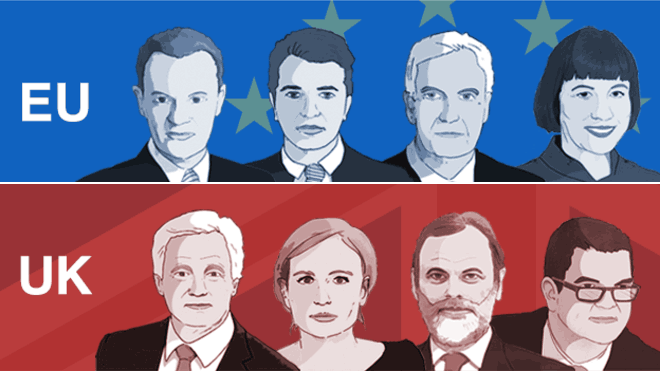Brexit: Key points in the EU's negotiation plan
- Published

European Council President Donald Tusk has said EU-UK trade talks could begin in the autumn
Twenty-seven European Union leaders meeting in Brussels formally endorsed the bloc's guidelines on negotiating Brexit on 29 April. Like the draft guidelines issued in March, the approved version is a plan for how the EU wants to manage negotiations with the UK, and says that talks on a trade deal will only start after the brass tacks of separation have been agreed. But a few changes were made to the document between the draft and final version.
Read the full guidelines, here., external
Here, the BBC's Reality Check correspondent Chris Morris teases out the key sentences and explains their significance.
1. Timing of negotiations
The European Council will monitor progress closely and determine when sufficient progress has been achieved to allow negotiations to proceed to the next phase.
What's the significance? This is about whether and when initial talks on separation, or "divorce" arrangements, can move on to discussion of a future trade deal. The UK wanted to talk about trade straight away but the EU is ruling that out. Donald Tusk, the European Council President, said it would be up to the other 27 countries to determine what "sufficient progress" actually means. It could happen in the autumn, he suggested - but this is the EU asserting its control over the process.
2. Who negotiates?

...there will be no separate negotiations between individual member states and the United Kingdom…
What's the significance? Will the UK try to divide and rule by exploiting differences of opinion between different member states as the talks progress? This sentence suggests the European Council is well aware of that possibility, and intends to get legally binding language written into negotiating directives to prevent it happening. There is a distinction, of course, between formal "negotiations" and what you might call "informal contacts" - so the UK will try to talk separately to other countries anyway.
3. Will there be a 'divorce bill?'

A single financial settlement - including issues resulting from the MFF [Multiannual Financial Framework] as well as those related to the European Investment Bank (EIB), the European Development Fund (EDF) and the European Central Bank (ECB) - should ensure that the Union and the United Kingdom both respect the obligations resulting from the whole period of the UK membership in the Union. The settlement should cover all commitments as well as liabilities, including contingent liabilities.
What's the significance?
There is more detail here than in the initial draft about the level of EU expectation when it comes to a financial settlement with the UK. It means the EU expects the UK to fulfil all the obligations it has made in the past, including for bills that will not be paid until after the UK has left the Union. This is confirmation that reaching agreement on how to calculate this financial settlement will be one of the biggest challenges of the initial phase of negotiations.
4. What about trade?

Any future free trade agreement…must ensure a level playing field in terms of competition and state aid, and must encompass safeguards against unfair competitive advantages…"
Translation: Don't be tempted to undercut the single market by trying to gain a competitive advantage at our expense. You won't get the deep and comprehensive free trade agreement you want if that happens.
5. How will trade talks work?
"Preserving the integrity of the single market excludes participation based on a sector-by-sector approach."
What's the significance? There had been suggestions in the UK that specific sectors like the car industry could be given some kind of special access to the single market. This sentence rules that out altogether. For the EU it is a non-starter.
6. EU citizens' right to stay

Such guarantees must be effective, enforceable, non-discriminatory and comprehensive, including the right to acquire permanent residence after a continuous period of five years of legal residence. Citizens should be able to exercise their rights through smooth and simple administrative procedures.
This reflects concern among EU member states that the UK is underestimating the technical difficulties of reaching an agreement on the issue of citizens' rights. There have to be legal guarantees, one senior official said, not just a gentlemen's agreement. And, at the moment of course, the ultimate legal authority for EU citizens is the European Court of Justice. That makes this a tricky political problem in the UK, not least because some of these issues will still be relevant decades into the future. The EU is also concerned that the UK Home Office is placing and will continue to place bureaucratic obstacles in the path of EU citizens trying to secure their future - this is a warning shot across British bows.
7. Financial regulation
Any future framework should safeguard financial stability in the Union and respect its regulatory and supervisory regime and standards and their application.
This has been added after pressure from the French and others who are concerned that the UK might be tempted to undercut EU standards in the financial services sector. The language here reinforces the view that the EU will not tolerate the UK trying to gain a competitive advantage through a much looser regulatory regime.
